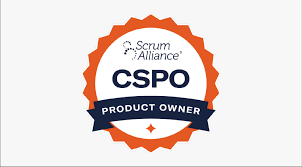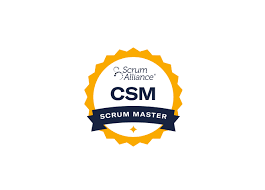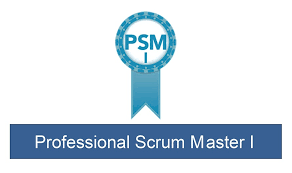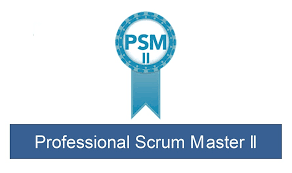A closer examination of the diverse roles Product Owners fulfill underscores the multifaceted nature of their responsibilities. Acting as intermediaries, 38% of Product Owners maintain critical relationships with stakeholders, while 24% set project business priorities and engage directly with customers to meet their needs. Additionally, 15% of Product Owners facilitate seamless collaboration and coordination within the Scrum team.
As a Certified Scrum Product Owner, you become a driving force behind Agile success, optimizing project outcomes, and delivering exceptional value to stakeholders and customers alike. Don't miss the chance to elevate your career and make a meaningful impact in the dynamic world of Agile project management.
Product Owners are professionals who handle a variety of responsibilities in Agile teams. Within a Scrum framework, a Product Owner plays a key role in defining the product vision and prioritizing features to maximize value. This rigorous CSPO training is what sets apart those who can strategically manage product backlogs and steer product development toward delivering high-quality results. This makes Product Owner roles key for any organization trying to benefit from Scrum.
Top Job Profiles and Salaries with the CSPO Certification
The skills professionals acquire through CSPO certification can be applied across many job roles. Some of the most relevant roles are as follows:
1) Product Manager
A Product Manager in an Agile environment takes responsibility for product decisions, particularly regarding features that impact value delivery to end-users. They ensure that product development aligns with business objectives and customer needs.
A CSPO certification is highly beneficial for Product Managers, equipping them with Agile skills that support both product-related roles and collaboration within Scrum teams. The average annual salary for a Product Manager ranges from $73K to $229K, according to Salary.com, with variations depending on factors like industry, experience, organization, and specific responsibilities.
2) Product Director
A Product Director holds a senior-level role, responsible for defining product strategy, vision, and roadmap. This position requires a blend of strategic and operational skills. The CSPO certification enhances a Product Director’s skill set, especially in Agile contexts, providing tools to manage and prioritize work that aligns with long-term goals.
With the CSPO certification, Product Directors can access strategies for improving collaboration with teams and delivering value continuously. Product Directors typically earn an average annual salary that ranges between $143K and $207K.
3) Chief Product Officer (CPO)
A Chief Product Officer is a senior executive responsible for the overall product strategy and product direction across an organization. CSPO training provides relevant tools for CPOs, who often work closely with Agile teams and leadership to create alignment around product strategies, ensuring they align with product goals and overall business objectives.
CSPO certification makes Chief Product Officers more effective at leveraging Agile methodologies to drive product innovation and achieve business outcomes. CPOs earn an average annual salary ranging from $237K to $360K, depending on the organization, location, and industry.
Benefits of CSPO Certification
A CSPO certification is one of the most widely recognized and in demand certifications for professionals in Scrum Product Owner Roles. If you work in an organization that practices Scrum doing a CSPO certification will be almost deemed mandatory. Even if you don’t practice Scrum in your organization the CSPO certification will empower you with skills that are relevant and valuable for product owners.
Following are some of the many benefits you can expect to gain from a CSPO certification:
1) Globally Recognized Credential
Certified Scrum Product Owner training is the basis on which learners are awarded the CSPO certification. CSPO certifications are issued by the Scrum Alliance, a renowned accreditation body for globally recognized Scrum certifications. It's one of the most in-demand certifications if you are looking for product owner jobs.
2) Increased Employability
Getting a CSPO certification automatically makes you a great fit for Product Owner roles in organizations that practice Scrum or want to use Scrum. The skills you acquire in the online CSPO certification training will help you enhance the scope of your role as a product owner even in organizations that do not use Scrum.
3) Higher Earning Potential
Certified product owners consistently earn more than their non-certified counterparts. The CSPO credential helps the professional get noticed by recruiters. With most organizations either practicing Scrum or showing a keen interest in Scrum, a CSPO certification opens new and better opportunities for a Product Owner.
4) Professional Credibility
Certified Scrum Product Owner training is focused on empowering the learner with all the important skills that a product owner would require. The CSPO credential shows that the learner has understood and demonstrated the ability to apply the concepts covered in the training. The CSPO certification is an important milestone in your product owner career path.
5) Best Practices
CSPO training is not just conceptual, the training sessions are led by experienced Certified Scrum Trainers (CSTs) who have practiced Scrum in some of the leading global companies. Apart from the concepts and techniques covered in the syllabus, you will also learn the practical application of Scrum in the real world.
6) Skill Development
CSPO training focuses on developing skills that are important to a product owner role. This includes skills like backlog management, customer engagement, product strategy, prioritization, planning, leadership, communication, and more.
7) Continuous Learning
Once you gain a CSPO certification you will only be starting your Agile journey. As a member of Scrum Alliance, you will keep learning about how Scrum is being used in various products around the world, and you will also interact with other product owners and Scrum professionals and learn from them throughout your career.
8) Higher Certifications
CSPO is an entry level beginner-friendly certification for the role of a product owner in a Scrum environment. You can gain more certifications as a product owner like A-CSPO, and CSP-PO which are also issued by the Scrum Alliance. You can also gain certifications in allied roles like the Scrum Master or Developer to get a more rounded understanding of Scrum roles and responsibilities.
Relevance of the CSPO Training
In today's Scrum-driven environment, the need for Certified Scrum Product Owners is surging, given that 90% of contemporary teams are embracing Scrum. Their crucial position in Agile teams assures swift ROI and maximized business value. Possessing a CSPO certification allows you to assume a pivotal role, endorsed by the Scrum Alliance.
The Scrum Product Owner Certification from the globally renowned Scrum Alliance endorses and validates your Scrum expertise while enabling you to take on the Product Owner role and responsibilities with dexterity, as you lead successful projects and ensure high-velocity releases of marketable products.
CSPO Training Key Highlights
Designed to empower professionals with the skills and knowledge needed to excel in the dynamic role of a Product Owner, the comprehensive CSPO course offers a blend of immersive learning experiences, practical applications, and ongoing support. From live instructor-led sessions to real-world simulations, our program is crafted to ensure you not only understand Scrum principles but can effectively apply them in your professional journey.
Discover the key features that set our CSPO training apart and prepare to transform your career in Agile project management:
1) 16 Hours of Live Instructor-Led Training:
Embark on an immersive learning journey with our 16 hours of live instructor-led training, where you'll engage in dynamic discussions, practical exercises, and expert guidance to deepen your understanding of Scrum principles and the role of a Product Owner. The trainings are led by Certified Scrum Trainers (CSTs) with extensive real-world experience. upGrad KnowledgeHut is a Registered Education Ally (REA) of Scrum Alliance.
2) Professional Development:
By completing our CSPO course, you'll earn 16 SEUs (Scrum Education Units) and PDUs (Professional Development Units), demonstrating your dedication to ongoing learning and advancing your professional skills. These valuable credits recognize your commitment to excellence in Agile practices and bolster your credentials within the industry. SEUs and PDUs are important to renew certifications and to showcase your commitment to continual learning.
3) Real-World Simulations and Activities:
Immerse yourself in the Scrum framework through real-world simulations and activities, designed to enhance your practical skills and decision-making abilities. Our hands-on approach ensures that you're well-prepared to navigate complex project scenarios with confidence.
4) Complementary Agile & Scrum E-Learning Worth $300:
Expand your knowledge base with complimentary access to our extensive library of Agile & Scrum e-learning resources, valued at $300. Delve into additional materials at your own pace, supplementing your live training experience for a comprehensive understanding of Agile practices.
5) Gateway to Largest Global Scrum Community:
Forge connections and insights within the global Scrum community through our exclusive gateway. Access forums, events, and networking opportunities to collaborate with fellow practitioners, share best practices and stay updated on the latest industry trends and innovations.
6) Access 2-Year Scrum Alliance Membership:
Enjoy the benefits of a 2-year Scrum Alliance membership, granting you access to a wealth of resources, including webinars, articles, and exclusive member events. Stay connected with the broader Scrum community and continue your learning journey beyond the duration of your CSPO course.
7) Comprehensive Job Support:
Benefit from comprehensive job support, including LinkedIn profile review, AI-resume builder and access to 1,500+ job listings.
8) Mentorship by Agile Industry Experts:
Tap into the expertise of Agile industry leaders through personalized mentorship opportunities. Receive guidance, feedback, and insights tailored to your specific career goals and challenges, empowering you to make informed decisions and achieve greater success in your Agile journey.
Skills Covered in the CSPO Training
The Certified Scrum Product Owner (CSPO) Certification is a foundational training for anyone looking to become a Product Owner within an Agile and Scrum organization. This certification is ideal for professionals interested in understanding Scrum and enhancing their product ownership skills. The CSPO training helps learners understand how to work effectively with Scrum teams and stakeholders to deliver high-quality products to market consistently.
Learn how to prioritize features, create value-driven product goals, and maximize the impact of the product backlog. Through this comprehensive CSPO training, you will gain an essential set of skills, including:
1) Product Vision
Gain insights into defining a clear, inspiring product vision that aligns with business goals. CSPO training equips learners to craft a compelling vision that sets out the product direction, engages stakeholders, and ensures that the team stays focused on delivering valuable outcomes.
2) Backlog Management
Learn to create and maintain an effective product backlog. Prioritize features based on business value, customer needs, and strategic alignment. Understand how to refine the backlog to ensure the highest-value items are ready for development and aligned with stakeholder expectations.
3) Stakeholder Collaboration
The CSPO certification focuses on techniques for collaborating with stakeholders with respect to gathering input, managing expectations, and communicating effectively. Develop skills for building trust with stakeholders, understanding their needs, and keeping them well informed about product progress and direction.
4) Customer-Centric Mindset
Adopt a customer-centric approach to product development by identifying and prioritizing customer needs. CSPO training teaches you how to integrate feedback loops, conduct user research, and implement changes that increase product satisfaction and value for end-users.
5) Prioritization Techniques
Learn best practices for prioritizing work in the backlog based on value, urgency, and dependencies. Understand how to balance short-term wins with long-term goals. Get teams to focus on the most impactful features while adapting to changes in requirements.
6) Agile Planning and Forecasting
Master skills required for effective release planning. Create realistic forecasts and learn to align releases with product goals. CSPOs must work with Agile teams to develop achievable plans and communicate progress, ensuring that delivery aligns with user needs and business strategy.
7) Leadership
Learn the principles of servant leadership, where you guide and empower your Scrum team to make informed decisions. Lead teams by fostering autonomy and encouraging team ownership. Create an environment where continuous improvement becomes the default.
8) Value Maximization
Learn techniques to maximize the value of the product through strategic decision-making. CSPOs are trained to focus on features and changes that enhance product value. Ensure that the product delivers meaningful results to users and meets business objectives.
9) Facilitation
Develop facilitation skills for guiding discussions and fostering collaboration. The CSPO role requires effective communication abilities to ensure alignment, and build a shared understanding. The training will also cover how to effectively resolve conflicts among team members and stakeholders.
10) Incremental Delivery
Scrum involves the delivering of work iteratively and incrementally. Learn how to guide your team in creating small, testable increments, gaining early feedback, and adapting based on user insights and performance.
11) Risk Management
Develop the skills to assess and mitigate risks while maximizing value. Learn to evaluate potential risks, make data-driven decisions, and prioritize tasks that add the most business value. Enable the organization to respond to changes in the market with agility.
12) Continuous Learning
Continuous learning is the key to surviving and thriving in a dynamic market. Learn how to embrace Agile principles, innovate, and refine your approach based on lessons learned, to ensure that the product remains competitive and relevant.



